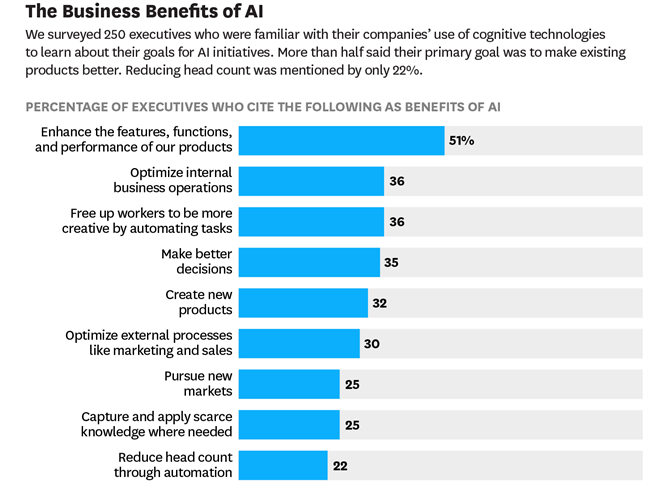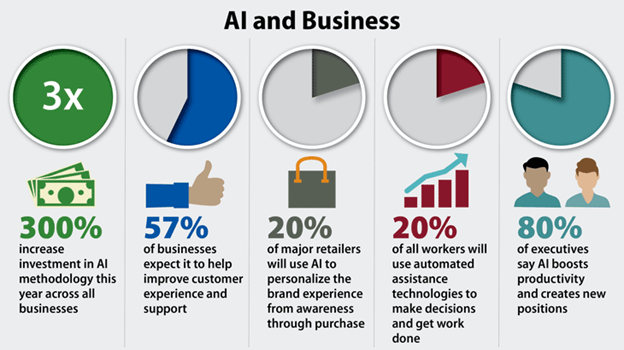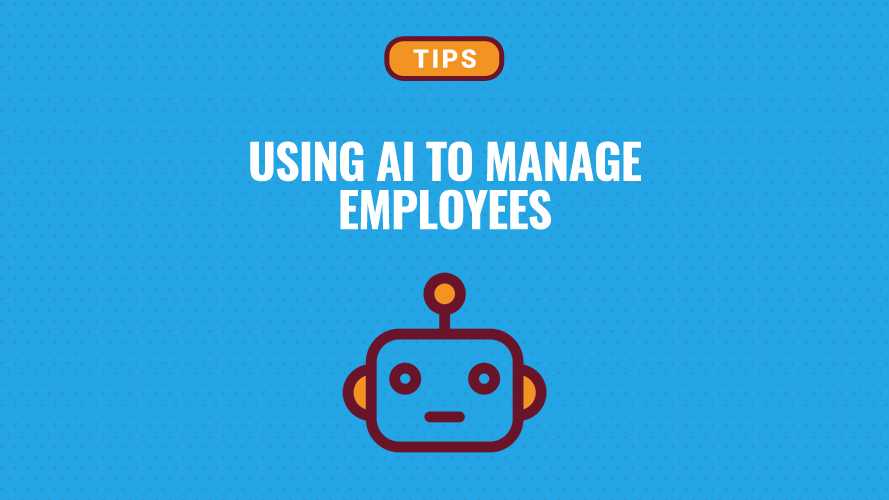Artificial intelligence is swiftly changing in every perspective of how we live our lives.
In this scenario, our work life is certainly not a matter of exemption. Artificial Intelligence’s alliance into human resources (HR) practices will make organizations stronger because they can interpret, predict, and diagnose to assist the HR teams in making better decisions. It wouldn’t be wrong to mention that work-life is the one that’s affected the most.
The more that the functions are automated due to the development of technology and its innovation, the more valuable are the tasks that are still handled by humans since they are still holding on to what has not been automated yet. Similarly, it’s becoming more challenging for the HR department to recruit, assign, and manage the tasks.
Why Do Businesses Use AI?
Artificial Intelligence is already impacting our home lives and will very soon play a much more significant role in our work lives. This has also brought vast development in the field of employee engagement and satisfaction. It shouldn’t surprise us that sooner or later, irrelevant to the fact whether you are working for a technical or non-technical organization, use of AI-aided tools will be in use. It’s noted that many organizations are already adopting the AI tools that are increasingly in use for day-to-day functions.
The AI’s application in the HR field and the business as a whole is vast. Right from developing and maintaining the relationships with the workforce as well as the customers to figuring out the patterns of extreme data volume to perform repetitive tasks. From a broader perspective, these are great advantages to most of the managers because it allows the manager and the management to focus more on how to add value to the organization. The significant aspect lies in embracing the opportunity that AI presents the business with, for both the individual’s and the organization’s prosperity and success. This includes the scaling of the skills and using AI to scale the impact.
The perspective of the organization’s management regarding integrating AI is quite important, whether it’s viewed optimistically as an opportunity for growth or just as another expense to the organization. The majority of the organizations furthermore are procrastinating in the integration of Artificial Intelligence into their HR activities because of the cost factor. And thus, they lose a significant opportunity of enhancing the growth of their businesses because it creates a better future when understood clearly and utilized well.

Image source: hbr.org
Does AI Help In Managing Employees?
Yes, Artificial Intelligence does help in employee management. There’s absolutely no doubt.
According to the research named International Research Journal of Engineering And Technology, it’s reported that AI could be embedded in HR activities such as recruiting, provision of training, onboarding process, performance management, employee retention, off-boarding, etc. Aren’t all these functions directly related to the employees? We do know that the answer is “yes.” If so, we can be sure that the management of the employees could be much better with the integration of AI.
Let’s try to understand this a little more in detail, as in how and in what ways does AI help in managing the workforce in an organization.
1. Employees Productivity
Be it any organization, the main objective towards the employees would be to maximize productivity as much as possible. I’m sure that all of us will agree with the fact that technology is a boon. And because of these developments in technology and the introduction of automation, multi-tasking has become too common and has made it possible to achieve the targets effortlessly. This has resulted in simplifying the tasks of the workforce. Although the advancement of technology works as a powerful tool, it has increased the complexity of the workplace. But, there’s a way out. You only need to make sure that the employees are acquainted with the new way of working. And to solve this issue, the organizations can adopt cloud-based solution systems, which can be operated centrally with the assistance of Artificial Intelligence tools.
This will help the organization to establish an employee-friendly atmosphere at the workplace. And this would result in the workforce engaging and appreciating that their workload is reducing and that the assigned tasks are completed on time with the help of these AI-aided tools.
2. Smart Digital Forms For Candidate Resumes
Enabling and connecting prospective employees according to the need of the company at the right time is a challenging task for HR. On a larger scale, if this needs to be achieved, the HR department needs to be gripped extensively to AI technology. To eliminate the repetitiveness of the same information, some companies have begun to use AI. This helps the candidates to transfer the details directly onto the smart digital forms from their resumes more efficiently and thus assists in completing their application.
Added to this, the information that’s recorded can be automatically sent for the background check and also the new hire forms. And in this case, the AI will be able to recognize the relevant information of the candidate. Once found, it can be stored and automatically input into the forms if needed in the future. Thus AI helps in reducing the repetition of the details over and over again.
3. Recruitment And Onboarding
We have just seen in the previous sub-point that artificial intelligence helps in the pre-screening process of the candidate. In other words, we can say that, even before we could step into the organization, the AI-enabled tools have already made sure that we are the right person for the job. This type of AI pre-screening of the candidates is adopted by many prominent organizations that hire thousands of employees in a year and also attract millions of applicants, who feel that this way of screening seems to be just and worthy. Mainly because the machine cannot make choices based on gender or demographical description. It’s purely based on the talent and capability of the candidate.
On the other hand, when we talk about onboarding, currently, AI-enabled chatbots are the trend as well as the right choice. It helps the new hires settle into their positions and get acquainted with the many and different facets of the company that the candidate joins.
For instance, a company that’s adapted to an AI-enabled chatbot can have their employees solve queries related to payroll such as payslips, attendance, leaves, etc., right at their fingertips and by themselves. And if the company has implemented a cloud-based payroll solution, the data can be accessed anytime and anywhere.
4. Workplace Surveillance
The organization that’s more concerned about productivity has begun to implement artificial intelligence to track and supervise the workforce’s tasks. No doubt, this has led to the situation of many employees feeling uncomfortable and very cautious. Because nobody would want to be monitored to the extent of noticing the productivity isn’t reached. However, from a broader perspective, it does contribute to the growth of the organization by tracking the exact time spent by the employees efficiently.
According to a survey, more than 50% of companies with a turnover of about 52.5K million are using digital data gathering equipment just to ensure monitoring the activities and performances of the employees. It also includes analyzing and determining the satisfaction of the employees as well as their engagement towards the organization.
5. Enhances Workforce
Although the development of technology and AI-enabled tools have been accepted, adapted, and implemented, there still is one reason that makes you look at them as an enemy. Enemy? It may sound a little strange, but some people, especially the typical employees, indeed look at it that way. It’s because of the fear that they have of the machines completely taking over human tasks and that it may leave them unemployed. Hence, there’s a need to help these employees understand their wrong perceptions. That what they feel is so different from what exactly the reality is.
The technology is not to be perceived from an opposing view, but the truth is that it enhances or augments. On the other hand, the idea of AI implementation is not to replace but to assist the employees in completing their tasks more efficiently.
6. Boosting Learning And Development Programs
In a couple of years, we can be sure that the field of teaching, learning, and development will go through a tremendous change. And in this change that will take place, AI has a major role to play. From the business and employee point of view, when we talk of learning and development, it doesn’t mean only AI skills and digital acquaintance. But also in preparing the employees for new roles.
And undoubtedly, this will require more human skills such as critical thinking, analytics, strategic planning, emotional intelligence, awareness of the culture, and so on. To be updated and move along with these changes, the learning and development departments must be transitioning towards an agile learning system.
7. Establishing OKR And It’s Results
Establishing the Objectives and Key Results (OKRs) is a forward-facing activity designed to create extreme precision and alliance on measurable near-term results. Excellent goal-setting software that governs AI helps teams set and obtain better target results.
By learning from preceding target results and the nuanced associations between objectives, management practices, and engagement patterns, AI provides teams in-the-moment insights to set OKRs that optimize their influence in the area.
8. Improve Team Accountability
The application of AI has the capability of maintaining a team by being able to give them more timely feedback to the members of the team and improve their accountability. AI can identify who among the team members needs positive feedback with the use of chatbots and natural language processing. Once identified, AI can let the manager know, and it can also identify the employees in need of extra coaching and training. And who would have thought earlier that they would see machines preparing one-on-one meeting agendas on their own after identifying and recognizing who needs what kind of feedback? All this is automated and very useful because a manager might lack time, and it may happen that he couldn’t keep up to giving regular feedback due to his busy schedule. But with these AI applications, as mentioned earlier, timely feedback and needed coaching to improve the accountability of the employees.

Image source: datamation.com
Conclusion
We are now aware of how the application of AI can transform our businesses. Whether we want to accept it or not, AI will become the next buzz in the field of IT sector businesses. Already many software companies are in the process of developing Artificial Intelligence on a whole different level.
It is also observed that despite AI being expensive, most companies have reshaped their workplace with them. Therefore, it’s necessary before we make any decision for the business, considering the AI factor and its applications for improved productivity and a well-manageable workforce.
This is because AI tools have the capability of speeding up your workforce by automating your work. And added to this, the companies involved in developing software are trying to offer more contextual multi-factor verification and flexibility to deliver a secure and simplified work atmosphere using AI tools.
Author bio
Divyang Metaliya is a Business Consultant. Apart from managing and improving business processes, his hobby is spreading his vast area of knowledge to the people out there. He loves to create content that is innovative and engaging for the readers.
